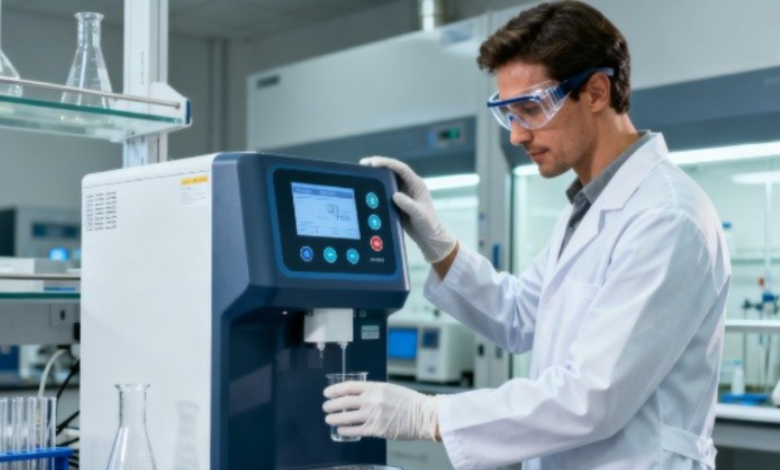Choosing the Right Laboratory Water Purifier

Importance of High-Quality Water in Laboratories
A laboratory water purifier is essential for research, clinical, and industrial laboratories where water purity directly affects the accuracy and reliability of experiments. Contaminated water can compromise chemical reactions, microbial cultures, and analytical results.
Laboratories rely on a laboratory water purifier to remove impurities, microbes, and chemical contaminants, ensuring that experiments produce consistent and reliable results. Investing in a high-quality system helps maintain scientific integrity and laboratory efficiency.
Types of Laboratory Water Purifiers
Laboratory water purifiers use different technologies to achieve high-purity water. Common methods include reverse osmosis, deionization, ultrafiltration, and UV sterilization. Each method targets specific contaminants, and often a combination of technologies is used in a single system.
Reverse osmosis is effective in removing dissolved salts and heavy metals. Deionization eliminates ionic impurities, while ultrafiltration removes particles, bacteria, and endotoxins. UV sterilization inactivates microorganisms to ensure microbiological safety. Choosing a system with multiple purification steps ensures consistent water quality.
See also: Smart City Living: How Technology is Revolutionizing Property Investment for NRI Tech
Determining Water Quality Requirements
Water quality requirements vary depending on laboratory applications. Analytical laboratories may need ultrapure water for techniques like HPLC or mass spectrometry, while clinical laboratories require water that meets regulatory standards for diagnostic accuracy.
Before selecting a laboratory water purifier it is essential to assess the required water resistivity, total organic carbon (TOC), and microbial limits. This ensures the system delivers water that meets the laboratory’s specific needs.
Evaluating System Reliability and Quality
The reliability and quality of a laboratory water purifier are critical considerations. High-quality systems are constructed from durable, corrosion-resistant materials and feature advanced purification modules to maintain performance under continuous use.
Reputable suppliers provide technical documentation, quality assurance certificates, and compliance with international standards. Regular maintenance and calibration ensure that the system continues to deliver consistent and accurate water quality.
Technical Support and Maintenance
Laboratory water purifiers require routine maintenance, filter replacements, and occasional troubleshooting. Selecting a supplier that offers responsive technical support ensures minimal downtime and uninterrupted laboratory operations.
Training staff on proper system operation, cleaning, and preventive maintenance is important for extending the life of the equipment and maintaining water purity. Access to skilled technicians from the supplier improves reliability and reduces the risk of contamination.
Cost Considerations and Long-Term Value
While price is an important factor, the total value of a laboratory water purifier should be considered. High-quality systems may have a higher initial cost but often provide longer lifespan, consistent performance, and lower maintenance expenses.
Many suppliers offer flexible purchasing options, service contracts, and consumable replacement plans. Evaluating the total cost of ownership, including energy use, maintenance, and replacement filters, helps laboratories make informed investment decisions.
Supplier Reputation and Reliability
The reputation of a laboratory water purifier supplier reflects the quality of their products and services. Established suppliers with proven track records, positive customer feedback, and industry certifications are more likely to provide dependable systems.
Laboratories can assess supplier reliability through testimonials, references, and case studies. Attending trade shows or conferences also provides insight into suppliers recognized for high-quality laboratory water purifiers.
Advanced Technological Features
Modern laboratory water purifiers include features that enhance usability and monitoring. Systems may offer real-time water quality monitoring, automated alerts for filter replacement, and remote diagnostics to improve efficiency and reduce operational errors.
Selecting a supplier that invests in research and development ensures access to advanced technology. These features enable laboratories to maintain consistent water quality while minimizing manual intervention and operational risks.
Sustainability and Environmental Responsibility
Many laboratory water purifiers are designed to reduce energy consumption and minimize water waste. Eco-friendly systems support sustainable laboratory practices and reduce operational costs.
Choosing a system with energy-saving features and recyclable components contributes to environmental responsibility without compromising performance. Sustainable design ensures laboratories meet regulatory requirements while promoting green practices.
Building Long-Term Supplier Relationships
Selecting a laboratory water purifier is more than a one-time purchase; it is about establishing a long-term partnership with a reliable supplier. Consistent product quality, timely support, and proactive service ensure smooth laboratory operations.
Regular communication with the supplier keeps laboratories informed about system upgrades, maintenance schedules, and new technologies. A strong partnership enhances operational efficiency, reduces risks, and ensures ongoing access to high-quality water.
Conclusion
Choosing the right laboratory water purifier requires careful evaluation of purification technologies, water quality requirements, system reliability, technical support, cost, supplier reputation, advanced features, and sustainability. A dependable supplier ensures uninterrupted access to high-purity water, which is critical for accurate research, clinical testing, and industrial processes.
Investing in a quality laboratory water purifier enhances experimental accuracy, operational efficiency, and long-term laboratory success. Partnering with a trusted supplier provides consistent water quality, expert support, and innovative solutions that meet the evolving needs of modern laboratories.




